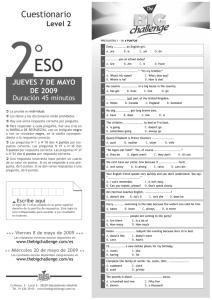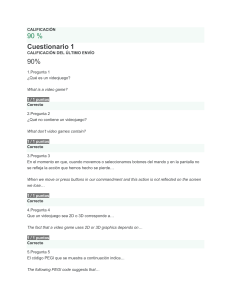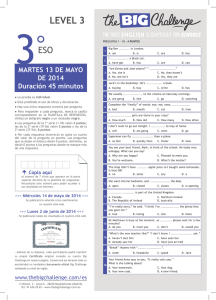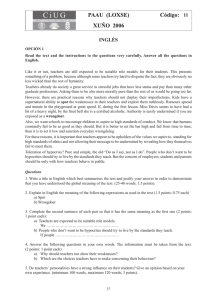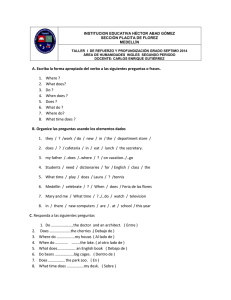Inglés
Anuncio
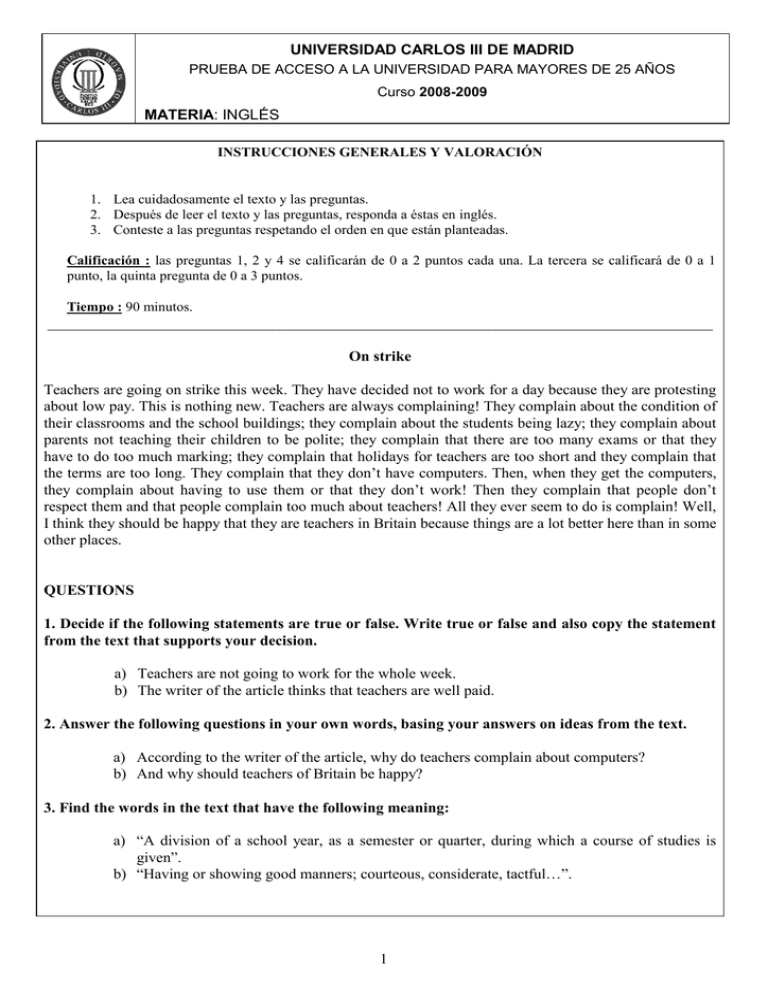
UNIVERSIDAD CARLOS III DE MADRID PRUEBA DE ACCESO A LA UNIVERSIDAD PARA MAYORES DE 25 AÑOS Curso 2008-2009 MATERIA: INGLÉS INSTRUCCIONES GENERALES Y VALORACIÓN 1. Lea cuidadosamente el texto y las preguntas. 2. Después de leer el texto y las preguntas, responda a éstas en inglés. 3. Conteste a las preguntas respetando el orden en que están planteadas. Calificación : las preguntas 1, 2 y 4 se calificarán de 0 a 2 puntos cada una. La tercera se calificará de 0 a 1 punto, la quinta pregunta de 0 a 3 puntos. Tiempo : 90 minutos. ______________________________________________________________________________________ On strike Teachers are going on strike this week. They have decided not to work for a day because they are protesting about low pay. This is nothing new. Teachers are always complaining! They complain about the condition of their classrooms and the school buildings; they complain about the students being lazy; they complain about parents not teaching their children to be polite; they complain that there are too many exams or that they have to do too much marking; they complain that holidays for teachers are too short and they complain that the terms are too long. They complain that they don’t have computers. Then, when they get the computers, they complain about having to use them or that they don’t work! Then they complain that people don’t respect them and that people complain too much about teachers! All they ever seem to do is complain! Well, I think they should be happy that they are teachers in Britain because things are a lot better here than in some other places. QUESTIONS 1. Decide if the following statements are true or false. Write true or false and also copy the statement from the text that supports your decision. a) Teachers are not going to work for the whole week. b) The writer of the article thinks that teachers are well paid. 2. Answer the following questions in your own words, basing your answers on ideas from the text. a) According to the writer of the article, why do teachers complain about computers? b) And why should teachers of Britain be happy? 3. Find the words in the text that have the following meaning: a) “A division of a school year, as a semester or quarter, during which a course of studies is given”. b) “Having or showing good manners; courteous, considerate, tactful…”. 1 4. Complete the sentences with one of the words in brackets. a) c) d) e) The film was really ………… (boring / bored). He was very ………….. (interesting / interested) about your social activities outside work. Paris is a really ………… (exciting / excited) place to visit. My brother was so ………….. (annoying / annoyed) about it. 5. Write between 80 and 100 words on one of the following topics. a) Would you ever go on strike? Why? Why not? b) Do workers usually go on strike in Spain? Make a comparison with other countries. 2 MATERIA: INGLÉS CRITERIOS ESPECÍFICOS DE CORRECCIÓN Puntuación maxima de la prueba : 10 puntos. Pregunta 1: Esta pregunta tiene por objeto comprobar la comprensión general del texto. Se calificará con cero puntos si la respuesta true / false no está justificada o si la justificación no es correcta. Pregunta 2: El alumno expresará en inglés una parte concreta de la información transmitida por el texto. Pregunta 3: Esta pregunta permite medir el conocimiento del léxico inglés. Se calificará con medio punto cada palabra correcta. Pregunta 4: Esta pregunta tiene por objeto comprobar los conocimientos morfosintácticos del alumno. Se adjudicará 0,5 puntos a cada transformación gramatical correcta. Pregunta 5: Con esta pregunta se pretende medir la capacidad de expresión escrita del alumno. Se valorará la riqueza léxica, la complejidad de las construcciones gramaticales utilizadas y el buen uso de la lengua. La respuesta que no se ciña al tema que se pide se calificará con cero puntos, independientemente del buen uso de la lengua, si este existiera 3 INGLÉS RESPUESTAS QUESTIONS 1. Decide if the following statements are true or false. Write true or false and also copy the statement from the text that supports your decision. a Teachers are not going to work for the whole week. (FALSE: they have decided not to work for a day) b The writer of the article thinks that teachers are well paid. (FALSE: no se dice nada al respecto They have decided not to work for a day because they are protesting about low pay. This is nothing new. Teachers are always complaining!) 2. Answer the following questions in your own words, basing your answers on ideas from the text. (LIBRE) a According to the writer of the article, why do teachers complain about computers? b And why should teachers of Britain be happy? 3. Find the words in the text that have the following meaning: a “A division of a school year, as a semester or quarter, during which a course of studies is given”. (TERM) b “Having or showing good manners; courteous, considerate, tactful…”. (POLITE) 4. Complete the sentences with one of the words in brackets. a The film was really ………… (boring / bored). (BORING) b He was very ………….. (interesting / interested) about your social activities outside work. (INTERESTED) c Paris is a really ………… (exciting / excited) place to visit. (EXCITING) d My brother was so ………….. (annoying / annoyed) about it. (ANNOYED) 5. Write between 80 and 100 words on one of the following topics. (LIBRE) a Would you ever go on strike? Why? Why not? b Do workers usually go on strike in Spain? Make a comparison with other countries. 4
